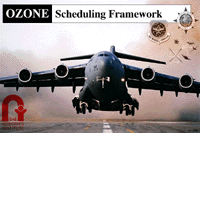We are developing theories, techniques and software architectures that address these problems, enabling both flexible collaborative problem solving between user and system, and flexible reconfiguration of system functionality to accommodate new domains and/or domain requirements. Our approach to mixed-initiative systems properly recognizes scheduling for what it is in most practical domains: an iterative process of “getting the constraints right” in which humans always have strategic, big-picture decision-making expertise and knowledge to contribute but are unable to effectively cope with the complexity of detailed solution development. We are developing a collaborative scheduling framework based on this process viewpoint, where the user visualizes and manipulates solutions from comprehensible, aggregate perspectives, and the system incrementally manages the details of user changes in accordance with communicated goals and expectations. Our approach to scheduling system architecture builds from object technology concepts. We are developing a general “ontology” of scheduling concepts to enable application in different domains and allow integration with other, complementary problem solving and information processing services. Our broader goal is a planning and scheduling “tool box”, an application construction environment which couples a system configuration infra-structure with expandable libraries of functional componentry.
current head
current staff
past staff
- Marcel Becker
- Eric Biefeld
- Charles Collins
- David W Hildum
- Laurence Kramer
- Ora Lassila
- Dirk Lemmermann
- Garrett Pelton
- Mark Shieh
- Allen Tseng


